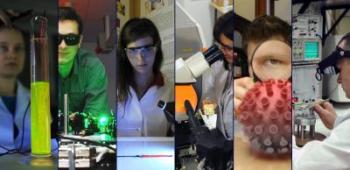Mar 6 2014
Science knows everything and is always ready with a clear answer to any problem – this is what we think of science while leaving school and how the media present it. The real science is, however, different. What's like? The answer can be found in an e-book prepared by the Institute of Physical Chemistry of the Polish Academy of Sciences in Warsaw.
 Science in the making is presented in an e-book from the Institute of Physical Chemistry of the Polish Academy of Sciences in Warsaw. The publication can be downloaded from the Institute's web page. Credit: IPC PAS, Grzegorz Krzy¿ewski
Science in the making is presented in an e-book from the Institute of Physical Chemistry of the Polish Academy of Sciences in Warsaw. The publication can be downloaded from the Institute's web page. Credit: IPC PAS, Grzegorz Krzy¿ewski
Terawatts of power in laser pulses, low cost graphene coatings. Luminescent nanotubes and air-breathing biofuel cells. Proteins confronting nanoviscosity inside living cells, flows improving medical diagnostics and drug testing in bacterial colonies clustering in controlled microdroplets. These and dozens other topics are presented in an electronic book prepared by the Institute of Physical Chemistry of the Polish Academy of Sciences (IPC PAS) in Warsaw. The research pursued at the IPC PAS is used to illustrate how science looks like where it is created and where the frontline of the contemporary chemistry meets physics, biology and technology. The e-book is available in Polish and English versions and can be downloaded free of charge from the Institute's web page.
"One year ago we prepared a similar publication that was very warmly received. So we decided now to update and extend it, and first of all to make it available to a greater number of readers", says Prof. Marcin Opałło, research director of the IPC PAS.
Polish chemistry has been for years at the world's leading edge, and the IPC PAS is an institute ranked first in its group in the national ranking of the Polish Ministry of Science and Higher Education. The Institute is also Poland's number one in the ranking of the SCImago Institutions Rankings (SIR) in the prestigious Q1 classification based on the number of publications in 25% world's highest ranked scientific journals. Thus, the articles in the book report competently on topics from the very frontline of the contemporary, state-of-the-art chemistry.
The publication includes a few dozen of popular science articles reporting the research of the scientists from the Institute of Physical Chemistry of the PAS. The articles are grouped into three chapters related to making discoveries, getting deeper understanding of nature, and applying the research findings in practice. So presented, science appears as a fascinating field, full of riddles, unceasingly aiming at extending of human perception and human capabilities.
"True science is the love for continuous exploration. That's why the book does not present ready answers but rather real research problems, often not fully solved, faced by contemporary researchers. We wanted to present the readers a reliable, well-founded knowledge, but also to show the quest for ways leading to the knowledge, the sources of inspiration, as well as the incessant wish to verify the information gained earlier that is so characteristic for the world of science", says Jarek Chrostowski, journalist and scientific editor responsible for the text of the publication.
Reading the e-book from the Institute of Physical Chemistry of the PAS the reader travels to remote interstellar clouds, where the density of matter is lower than the laboratory vacuum and where surprisingly complicated molecules can be still discovered. He or she learns how astronomy can be used in testing samples for materials engineering, what problems faces science while attempting to study the rate of chemical reactions in bacterial and mammalian cells, and is no more surprised why cloned cat is different from the original. The reader discovers surprising properties of the phenomena as common as evaporation – and so unusual as proton tunnelling in molecules, and learns how to create molecular cages delivering drugs to selected points of the human body, how to detect single molecules of harmful agents and why we should study the performance of molecular motors.
The last, fourth chapter of the e-book presents organisational efforts of the Institute of Physical Chemistry of the PAS aiming at the development of science and Polish scientific community.
"With our publication we want to send a clear message especially to young people. Yes, chemistry and physics are interesting, moreover, they are fascinating, and additionally there is a plenty to do in these fields of science. Every open mind can join us and, as ourselves, build up knowledge – for his or her own curiosity and for the good of the entire society", notices Prof. Robert Holyst, the director of the IPC PAS.